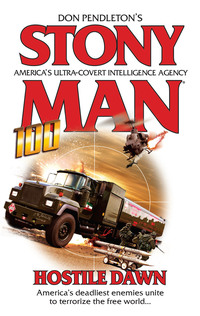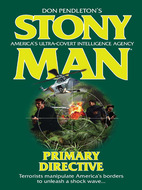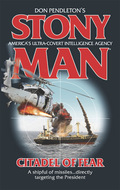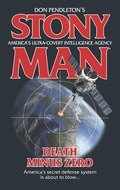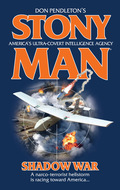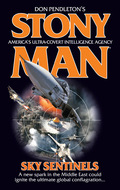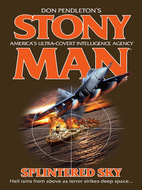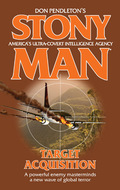Kitap dosya olarak indirilemez ancak uygulamamız üzerinden veya online olarak web sitemizden okunabilir.
Kitabı oku: «Hostile Dawn», sayfa 2
CHAPTER THREE
Airspace over San Diego County, California
It was only after he’d put the Gulfstream back on autopilot that Kouri Ahmet began to come down off the adrenaline rush that had powered his desperate ploy to thwart his extradition to Los Angeles. As he sat back in the jet’s cockpit, waiting for his pulse to return to normal, the Lebanese expatriate thought back on the past several minutes, savoring details that, at the time, had flashed by in a blur.
The small government transport jet had hit a pocket of turbulence shortly after crossing the Mexican border and when the Gulfstream had begun to rock, Ahmet had taken note of the U.S. Air Marshal’s distraction and made his move. Bolting from his seat, the terrorist had lunged across the aisle and burrowed his shoulder into the other man’s solar plexis, knocking the wind from his lungs. That had bought Ahmet the time necessary to draw his shackled hands beneath his waist and wriggle them forward until his arms were no longer pinned behind his back. The marshal was still disoriented when Ahmet had rendered him unconscious, using the handcuffs as a makeshift garrote. It had all happened in a matter of seconds, and by the time the plane had cleared the turbulence, Ahmet was on his feet, the officer’s 9 mm Colt pistol clenched in his fist. The door to the cockpit had been locked, but two well-placed rounds had given him access to the pilot. The pilot had been armed, but Ahmet had put a bullet through his skull before he’d had a chance to reach his gun. Though hindered by his ankle cuffs, the prisoner had managed to drag the other man from his seat and take over the controls long enough to bring the plane to a lower altitude. Once he’d set the Gulfstream on autopilot, he’d hauled the pilot back into the main cabin. By then, the marshal had regained consciousness, but Ahmet had quickly finished him off with a gunshot to the heart. After opening the outer door, he’d disposed of the bodies—first the marshal, then the pilot. Suddenly, in a matter of moments, the terrorist’s doomed future had taken a dramatic turn.
Ahmet had boarded the plane back in La Paz with no set escape plan, but now, with the plane back up to twenty thousand feet on a diverted course toward Riverside County, Ahmet reflected that it was unlikely that any orchestrated attempt could have succeeded any better than the gambit he’d just executed. Some would have attributed such good fortune to serendipity, but for Ahmet it was the guiding hand of God that had intervened on his behalf. He offered up a quick prayer of thanks, then ceased his ruminations. There was, after all, work to be done. Ahmet was still in shackles, dressed in a telltale prison-orange jumpsuit at the controls of a plane that soon, no doubt, would be the object of an intense aerial manhunt. Yes, he’d overpowered his captors and placed himself more in control of his fate, but the renegade knew that he was still a long way from being free.
Stony Man Farm, Virginia
H AL B ROGNOLA AND Barbara Price were halfway through the tunnel leading back to the main house when the Stony Man director received the news on his earbud transceiver.
On Brognola’s signal, Price turned the electric cart around and headed back toward the Annex. Brognola, meanwhile, wrapped up his long-distance call with Able Team’s interim pilot, Jack Grimaldi, who was on the other side of the continent, manning the controls of a loaner F-16 fighter jet he’d just lifted off the runway at Edwards Air Force Base.
“Yes, by all means intercept him if you can,” Brognola said, reaching into his trench coat for a plastic-wrapped cigar. “With any luck, he’s still airborne.”
“He doesn’t have much of a jump on us,” Grimaldi replied. “Hell, we were already out on the runway waiting for him when we got the word.”
“Still, there’s a lot of airspace between Barstow and San Diego,” Brognola said. “I’ll get Camp Pendleton to send somebody up to help out.”
“Fine by me,” Grimaldi said. “But what if we get to him first?”
“We’d obviously like him alive for questioning, but do what you have to. We can’t let him get away.”
“Got it.”
When he heard Grimaldi click off, Brognola silenced his earbud transceiver and peeled the wrapper from the cigar. There’d been a time, years ago, when he smoked expensive, hand-rolled Havanas, but now cigars were nothing more to him than a prop, something to keep his hands busy at times, like this, when the going got tough and his nerves were rattled.
“Something went wrong with Ahmet’s transfer,” Price said. It was more a statement than a question. She’d already deduced what had happened from listening to Brognola’s side of the conversation.
“Afraid so,” the big Fed replied, rolling the cigar between his fingers. “Some college kids near San Diego just came across two bodies that dropped out of the sky at a park near there. One’s the pilot of the transfer plane and the other’s the federal Air Marshal who was guarding Ahmet. They’d both been shot with the marshal’s pistol. We have to assume Ahmet’s behind it, which means he’s on the loose in a Gulfstream 100.”
“It shouldn’t have happened.” Price parked the cart and both she and Brognola retraced their steps to the Computer Room. “You’d think they would have had the guy chained to his seat with more than one guard watching him.”
“You’d think so,” Brognola conceded. “But apparently the idea was to go easy on the restraints in hopes of buttering him up. Not a great idea in my book, and I’m sure somebody’s being called on the carpet about it as we speak.”
“As well they should,” Price said. “Now, instead of having Ahmet dropped in their lap, Able Team has to go out and find him.”
CHAPTER FOUR
Airspace over San Bernardino and
Riverside counties, California
“This is more like it,” Jack Grimaldi said, speaking through his headset microphone with Able Team commander Carl Lyons, seated behind him in the gunner seat of the F-16 fighter jet.
“Yeah, I’ll take a weapons pylon over those damn recliner seats any day,” Lyons said, staring out the gunner window at the rugged desert terrain below. “Now let’s just hope we can track this scumbag down. The longer he stays off our radar, the better his chances of getting away.”
“Pedal’s to the metal,” Grimaldi said, opening the jet’s throttles. “If he’s still in the air when we spot him, he won’t be able to outrun us.”
“The Marines are closer,” Lyons said, “but at this point I don’t care who gets him, as long as he’s taken out of the mix. Finding the rock al Qaeda’s hiding under is hard enough without splitting our focus.”
Able Team’s search for the sleeper cell in Barstow had produced only limited results. They’d managed to secure an address linked to Army Gideon, the paramilitary group rumored to be offering explosives to the al Qaeda team, but when they’d raided the site, located a few miles to the south in Oro Grande, they’d found the place deserted. There’d been traces of gunpowder on the property, and a day-old newspaper had been found stashed in a trash barrel along with scraps of fast food that had yet to spoil, convincing Lyons and the others that the compound had been only recently evacuated.
A visit to the burger franchise matching the food wrappers had determined that the meals had been purchased by Gideon members rather than the al Qaeda team, but Able Team had chanced upon a lead soon after when they’d stopped for gas at the only service station in the area. They learned the cashier had sold a handful of maps to a man who roughly matched the description of Mousif Nouhra, the purported field leader for the al Qaeda team. The maps had been for the L.A. freeway system, lending credence to the theory that the terrorists were hoping to somehow cripple the city’s transportation network. Nouhra had also apparently asked for directions to southbound I-15, suggesting that the terrorists were headed back to Los Angeles.
Lyons’s colleagues, Rosario “Politician” Blancanales and Hermann “Gadgets” Schwarz, had already headed back to L.A., armed with a description of Nouhra’s Dodge Caravan. After receiving word of Kouri Ahmet’s aerial escape, Lyons had called both men, advising them to switch gears and provide ground support in the search for the Lebanese fugitive. The plan now was for Blancanales and Schwarz to check out private airfields south of L.A. on the chance Ahmet would decide to quickly land the hijacked Gulfstream and seek out another avenue of escape.
As Grimaldi gunned the F-16 across the desert between Barstow and L.A., Lyons changed frequencies on his headset transceiver and touched base with Blancanales.
“What’s your position, Pol?”
“I’m on the 405, just passing through Westwood,” Blancanales reported. “Once I hit the ‘10’ split, I’m going to dog it east toward San Bernardino. Gadgets is a few miles ahead of me. He’ll keep heading south. We’ll update you once we reach the airfields.”
“Good enough,” Lyons responded. “If we spot our guy from up here, I’ll let you know so you can change course.”
“Got it.”
“But, if you happen to spot that Caravan out on the road, by all means forget about Ahmet and run an intercept.”
“Not gonna happen, but I’ll keep my eyes open,” Blancanales promised.
Lyons clicked off and passed along word to Grimaldi, then lapsed into silence.
We’ve got our hands full on this one, he mused darkly.
Grimaldi had powered the fighter jet over the freeway and toward a relatively uninhabited mountain region when a call came in from a MAG-39 pilot from Camp Pendleton who’d taken another F-16 to the sky in search of Kouri Ahmet.
“I have visual contact with the Gulfstream,” the Marine pilot reported. When he gave his position, Grimaldi was quick to respond.
“We’re in the neighborhood. Stay on him and wait for us to catch up.”
Grimaldi banked the fighter jet and veered eastward toward the wilderness stretching between Hemet and Palm Springs. A few minutes later, both the Marine jet and the hijacked Gulfstream appeared on the horizon.
“Looks like showtime,” Grimaldi told Lyons through his headset. He patched through to the other pilot and asked, “Any word from Ahmet?”
“Negative,” the pilot answered. “I’ve put through calls telling the guy to bring the plane down and surrender, but he’s incommunicado.”
“No surprise there.”
Grimaldi nosed the Fighting Falcon and dropped another thousand feet before leveling off on a course parallel to that of the Gulfstream. Behind him, at the gunner controls, Lyons lined up the other plane in his sights.
“Sucker’s got its fly open,” Grimaldi said.
Lyons looked and saw that the side door of the Gulfstream was ajar.
“He might’ve just left it open after tossing the bodies,” Lyons said.
“Try again,” Grimaldi said, inching still closer to the other craft. “There’s nobody in the cockpit. Bastard has the thing on autopilot!”
“He jumped?” Lyons said.
“That’s gotta be it,” Grimaldi replied. “And unlike the guys he tossed, I’m guessing he bailed with a parachute.”
San Jacinto Wilderness Preserve,
Riverside County, California
K OURI A HMET HAD JUST FINISHED stuffing his wadded parachute into a narrow crevasse deep in the heart of the San Jacinto Wilderness Preserve when he’d spotted the first of his aerial pursuers. He’d crawled beneath a jutting outcrop as one of the fighter jets had passed overhead and now, moments later, he heard a distant explosion in the air. His feet still tethered close together by ankle cuffs, Ahmet shuffled from cover and stared over the treetops, just in time to catch a glimpse of the disintegrated remains of the Gulfstream he’d hijacked earlier. The shards were raining from the sky, leaving behind a dark cloud of smoke. There was a second fighter jet in the sky, headed south, away from the falling debris.
Ahmet cursed. He’d figured the Gulfstream would wind up being shot down, but he’d hoped it would have taken longer for the enemy to realize he’d abandoned the aircraft. Any moment now, he knew both jets would likely double back, on the lookout for him. The jets’ surveillance capacities would be hindered by their speed and the need to fly at a high altitude, but it would be only a matter of time before helicopters were called in to assist in the search. Ahmet knew he would have to act fast to avoid being captured.
As he’d parachuted to the ground, the fugitive had spotted a campground to the north, and it was in that direction that he now headed, taking a circuitous route dictated by the rambling oak trees he took cover beneath, hoping their thick canopy would conceal him from view by those looking down from overhead. He was still wearing his prison-orange jumpsuit, and his hands, like his ankles, were still bound by cuffs. It would be impossible for anyone to see him and not realize he was an escaped prisoner.
Armed with the two Colt pistols he’d taken from the men he’d killed when taking over the Gulfstream, Ahmet made his way cautiously across the unruly terrain, stopping briefly when he heard the two jets pass by in quick succession. Once the drone of their turbos faded, he broke from cover and continued toward the campground. As with his escape, he had no set plan. All he knew was that he needed to gain access to some kind of vehicle. If he could get behind the wheel and out on an open road, it would then be only a matter of making his way to a main thoroughfare. There he could get lost in traffic and buy the time he needed to contact the allies he knew were hiding out only a short drive from where he’d chosen to bail from the jet.
The opportunity Ahmet had been seeking presented itself a few minutes later. Following the treeline, the fugitive had straggled up a slight incline overlooking a narrow, well-trodden path. When he heard the steady pounding of a hammer, Ahmet dropped to his knees and inched toward the edge of the incline. Downhill, thirty yards to his right, a park ranger was using a sledgehammer to drive fence posts into holes he’d augered in the hard-packed soil. A roll of wire fencing lay on the ground next to him. From the looks of it, the ranger was preparing to close off a section of the trail. He was working alone, his back turned to Ahmet, wearing a noise-reduction headset to mute the sound of his pounding. As if that weren’t enough reason to rally the renegade’s spirits, a set of bolt cutters lay atop the fence roll and, another ten yards away, a Ford F-150 pickup bearing the stenciled logo of the State Forestry Service was parked under the shade of a eucalyptus tree.
Perfect.
Ahmet rose to a crouch and, still hindered by his ankle restraints, awkwardly advanced along the incline. Once he was standing directly above the ranger, he coiled his legs, waiting for the right moment to strike. As the ranger began to bring the sledge bearing down on the post, Ahmet made his move. He leaped forward, arms outstretched, one knee extended in front of the other.
The ranger had just struck the post when Ahmet collided with him, driving his knee into the other man’s spine. He brought his hands down hard, making sure that the exposed butt of each handgun avoided the man’s headset and connected squarely with his skull. The sledgehammer fell from the ranger’s grasp as he collapsed under Ahmet’s weight. The two men tumbled to the ground, and only one of them got back up.
Ahmet wasn’t sure if he’d killed the ranger, but he wasn’t about to take any chances. Setting down his two guns, he grabbed the sledgehammer and lofted it into the air, then brought it crashing down on the other man’s head with a sickening thud.
By now Ahmet was bathed in sweat and breathing heavily, but there was no time to rest. He cast aside the sledgehammer and quickly snatched up the bolt cutters. Snipping the ankle restraints was easy enough, and with considerable more effort he was able to prop the cutters in such a way that they could chew their way through the links of his handcuffs. Liberated, he shook his legs and then waved his freed arms back and forth, loosening the stiffened muscles. Now able to move more freely, he dragged the ranger’s body to the truck and maneuvered it up into the rear bed. Once he’d stripped the man of his uniform, Ahmet set the clothing aside and draped the body with a tarpaulin. He would worry about where to dispose of it later.
The fugitive backtracked to the fence posts for his stolen guns, then returned to the truck and quickly peeled off his sweat-drenched jumpsuit, stuffing it under the tarp next to the ranger’s body.
The ranger had been slightly taller than Ahmet, and when he put on the dead man’s clothes they fit loosely. It served the fugitive’s purposes, as the long sleeves and pant legs enabled him to conceal the severed cuffs still clenched around his wrists and ankles.
The pickup’s keys were in the ranger’s pockets. Ahmet took them, climbed into the truck and set his two weapons on the bench seat beside him. He grinned with satisfaction as he started the engine and put the truck in reverse. So far, so good.
Backing away from the work area, Ahmet came to a dirt service road. He shifted gears and followed it northward, winding past the campground and mountain foothills, a cloud of dust trailing behind him. He made his way without incident, encountering no one until he reached the park entrance. There, another ranger was standing outside a small wooden shack stocked with parking stickers, brochures and maps of hiking trails. Normally, the man would have been posted inside, dealing with visitors as they entered the site. Due to fire conditions, however, the park was closed, as Ahmet realized when he saw a drawn gate barricading his way to the main road. The other ranger, it turned out, was taking advantage of the closure to paint the shack’s clapboard exterior.
Ahmet cursed under his breath as he approached the shack. Reducing his speed, he took one hand from the wheel and grabbed a wide-brimmed hat resting on the seat beside the two pistols. He propped the hat on his head, brim pulled down low. He doubted the ruse would work, but if it bought him a few seconds, that would be all he’d need.
The pickup had come to within twenty yards of the shack when the other ranger turned from his painting and glanced Ahmet’s way. Head bowed slightly, the fugitive offered a slight wave, taking care not to expose the handcuff tucked beneath his shirtsleeve. The ranger glanced fleetingly at Ahmet and waved back nonchalantly. He was about to return to his painting when he did an apparent double-take and looked back. Confirming that an impostor was driving the truck, the ranger dropped his paintbrush and grabbed for the walkie-talkie clipped to his waist.
Before the ranger could send out a distress call, Ahmet fired twice, pumping two 9 mm rounds into the man’s chest. The ranger staggered backward, bounding off the shack and then falling to the ground, fresh paint imprinted on the back of his uniform.
Ahmet shifted into neutral and jammed the parking brake, then bounded out, quickly dragging the ranger to the back of the truck. He dropped the tailgate and strained again as he hoisted his latest victim up onto the truck bed. He shoved the corpse next to that of the ranger he’d killed earlier, then raided the man’s pockets for his keys and wallet. Once he’d covered the bodies and raised the tailgate, he went to the gate, trying seven different keys before he found the one that worked the lock. He swung the gates open, then drove through to the other side and brought the truck to another stop, getting out long enough to close the gates behind him.
Moments later, he was on the main road, heading for the two-lane highway that, in time, would take him to the major arterial freeways. Once there, he would head west and meet up with Mousif Nouhra and the members of his al Qaeda sleeper cell. Yes, they would be disappointed that he’d failed in his attempt to smuggle in rocket launchers from Mexico, but once they learned of his daring escape, he was sure that they would be impressed enough to abide by his supervision. There was, after all, a mission still to be carried out.
Ücretsiz ön izlemeyi tamamladınız.
